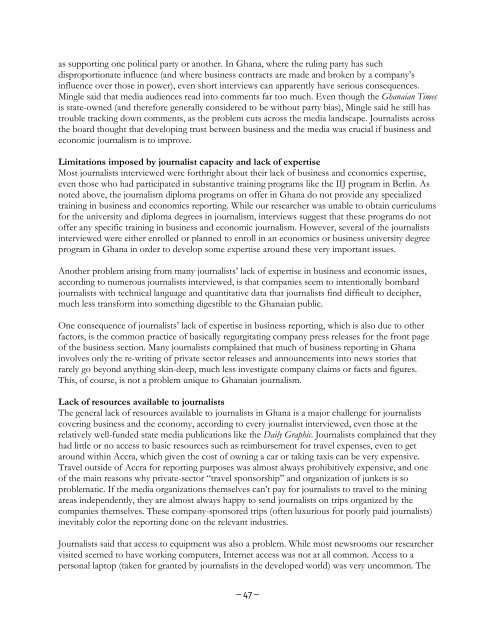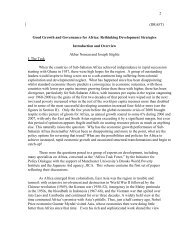Access to in<strong>for</strong>mationNearly every journalist interviewed told a story about how difficult it is to get in<strong>for</strong>mation in Ghana,both from the private and public sectors.Businesses, journalists said, were usually very reluctant to share in<strong>for</strong>mation with the media. Manyjournalists attributed this to a lack of trust between the private sector and the media. And manybusinesses, according to journalists, simply don’t see the rationale or benefit in working with themedia, or why and how it might be in their best interest to do so.Government is just as closed as the private sector when it comes to in<strong>for</strong>mation, if not more so,according to all journalists interviewed. Journalists say Ghana’s government knows very well thatin<strong>for</strong>mation is power, and it doesn’t intend to cede much of it to the Fourth Estate, particularlyaround sensitive issues such as budgetary matters and royalty agreements over Ghana’s vast naturalresources. Many journalists complained that access to even uncontroversial documents likeannounced budgets and government policy is sometimes never granted.Jo Ellen Fair, of the University of Wisconsin-Madison, wrote a recent article in Dissent magazine inwhich she examined the Ghanaian government’s “soft control” of the press:A media system that is private, commercial, but acutely aware that it serves a nationbound to the state – in other words, a “normal” media system in our neoliberal age –is constantly but softly controlled by the interests that it serves…In early January[2008], the current minister of in<strong>for</strong>mation told the press, “Although you havesometimes been critical of government, you have really enriched good governance inthis county. While I urge you toward greater professionalism and accuracy, I assureyou all that this government appreciates your contribution and will continue to workwith you to ensure the preservation of your freedoms and the protection of yourrights.” Journalists understand that such words are both hortatory and cautionary.They also understand that if they do not heed calls to shape up, their work may drawthe ire of the National Media Commission, which sets ethical guidelines andbroadcast standards, monitors news content, and en<strong>for</strong>ces the right of personsoffended by press reports to reply.Fair’s critique of the “soft control” wielded by Ghana’s government corresponds with what manyjournalists complained about in their dealings with both the government and the private sector.The journalists unanimously agreed that passage of the Freedom of In<strong>for</strong>mation Act bill, delayed inthe Parliament since 2003, would significantly improve the ability of journalists to gatherin<strong>for</strong>mation from the government.Many journalists also said that access to sources and experts was also extremely limited, and greatlyaffected the quality of journalism produced in the country. To some degree, journalists said that thiswas because there simply are not many experts on the relevant issues in Ghana, particularly aroundtechnical business and economic matters like the extractive industries. However, even when thereare experts and knowledgeable sources, getting them to agree to an interview can be very difficult.Edmund Mingle of the Ghanaian Times said that many sources didn’t want to comment because ofpolitical concerns, <strong>for</strong> fear that if they say something (even uncontroversial), they might be perceived– 46 –
as supporting one political party or another. In Ghana, where the ruling party has suchdisproportionate influence (and where business contracts are made and broken by a company’sinfluence over those in power), even short interviews can apparently have serious consequences.Mingle said that media audiences read into comments far too much. Even though the Ghanaian Timesis state-owned (and there<strong>for</strong>e generally considered to be without party bias), Mingle said he still hastrouble tracking down comments, as the problem cuts across the media landscape. Journalists acrossthe board thought that developing trust between business and the media was crucial if business andeconomic journalism is to improve.Limitations imposed by journalist capacity and lack of expertiseMost journalists interviewed were <strong>for</strong>thright about their lack of business and economics expertise,even those who had participated in substantive training programs like the IIJ program in Berlin. Asnoted above, the journalism diploma programs on offer in Ghana do not provide any specializedtraining in business and economics reporting. While our researcher was unable to obtain curriculums<strong>for</strong> the university and diploma degrees in journalism, interviews suggest that these programs do notoffer any specific training in business and economic journalism. However, several of the journalistsinterviewed were either enrolled or planned to enroll in an economics or business university degreeprogram in Ghana in order to develop some expertise around these very important issues.Another problem arising from many journalists’ lack of expertise in business and economic issues,according to numerous journalists interviewed, is that companies seem to intentionally bombardjournalists with technical language and quantitative data that journalists find difficult to decipher,much less trans<strong>for</strong>m into something digestible to the Ghanaian public.One consequence of journalists’ lack of expertise in business reporting, which is also due to otherfactors, is the common practice of basically regurgitating company press releases <strong>for</strong> the front pageof the business section. Many journalists complained that much of business reporting in Ghanainvolves only the re-writing of private sector releases and announcements into news stories thatrarely go beyond anything skin-deep, much less investigate company claims or facts and figures.This, of course, is not a problem unique to Ghanaian journalism.Lack of resources available to journalistsThe general lack of resources available to journalists in Ghana is a major challenge <strong>for</strong> journalistscovering business and the economy, according to every journalist interviewed, even those at therelatively well-funded state media publications like the Daily Graphic. Journalists complained that theyhad little or no access to basic resources such as reimbursement <strong>for</strong> travel expenses, even to getaround within Accra, which given the cost of owning a car or taking taxis can be very expensive.Travel outside of Accra <strong>for</strong> reporting purposes was almost always prohibitively expensive, and oneof the main reasons why private-sector “travel sponsorship” and organization of junkets is soproblematic. If the media organizations themselves can’t pay <strong>for</strong> journalists to travel to the miningareas independently, they are almost always happy to send journalists on trips organized by thecompanies themselves. These company-sponsored trips (often luxurious <strong>for</strong> poorly paid journalists)inevitably color the reporting done on the relevant industries.Journalists said that access to equipment was also a problem. While most newsrooms our researchervisited seemed to have working computers, Internet access was not at all common. Access to apersonal laptop (taken <strong>for</strong> granted by journalists in the developed world) was very uncommon. The– 47 –
- Page 1 and 2: THEREWILLBE INKA study of journalis
- Page 3 and 4: AcknowledgementsThis paper has bene
- Page 7 and 8: Executive SummaryPurpose of the Rep
- Page 9 and 10: journalists in these countries that
- Page 11 and 12: Existing International Training Opp
- Page 13 and 14: • Consumer Affairs and Informatio
- Page 15 and 16: Background 3Of the three countries
- Page 17 and 18: pervasive conflict in the Niger Del
- Page 19 and 20: 3) Crises or disruptions, where som
- Page 21 and 22: Low pay and low regardOne of the mo
- Page 23 and 24: Even in cases where working journal
- Page 25 and 26: But while some reporters think FOIB
- Page 27 and 28: When asked how much the media could
- Page 29 and 30: the effects of these challenges for
- Page 31 and 32: detailed analysis of the opportunit
- Page 33 and 34: journalist said he has, however,
- Page 35 and 36: completely make use of some of the
- Page 37 and 38: money. Their knowledge of what medi
- Page 39 and 40: Notes on conducting research in Nig
- Page 41 and 42: Ghana- 35 -
- Page 43 and 44: evenues each year,” 106 which wou
- Page 45 and 46: entertainment news, scandals, and p
- Page 47 and 48: The rise of business-focused journa
- Page 49 and 50: coverage of the oil industry is als
- Page 51: needed supplementary income to cash
- Page 55 and 56: Numerous journalists recounted how
- Page 57 and 58: Training programs available to busi
- Page 59 and 60: Amos Safo, editor-in-chief at the p
- Page 61 and 62: Notes on conducting research in Gha
- Page 63 and 64: Background 136Literacy and Educatio
- Page 65 and 66: “sufficient information” about
- Page 67 and 68: or criminal charges for content the
- Page 69 and 70: have such difficulty obtaining info
- Page 71 and 72: The majority of those interviewed b
- Page 73 and 74: commitment to their profession and
- Page 75 and 76: Notes on Conducting Research in Uga
- Page 77 and 78: Recommendations for Revenue Watch I
- Page 79 and 80: people who have no journalism backg
- Page 81 and 82: analyzes business,” he said, “e
- Page 83 and 84: A journalist with The Punch said,
- Page 85 and 86: The Media Foundation for West Afric
- Page 87 and 88: Length of TrainingRoughly three-qua
- Page 89 and 90: industries, for instance, ought to
- Page 91 and 92: otherwise being published in the pr
- Page 93 and 94: Non-Training Recommendations for Ug
- Page 95 and 96: Appendix A: NigeriaPotential Partne
- Page 97 and 98: journalists. Biakolo is very profes
- Page 99 and 100: Television Stations• Nigerian Tel
- Page 101 and 102: have two to four month professional
- Page 103 and 104:
City: AccraTelephone: +233 (021) 22
- Page 105 and 106:
Fax: +256 414 255 495E-mail: umdf@a
- Page 107 and 108:
• What do you think are the most
- Page 109 and 110:
Appendix E: Survey Questions1. Name
- Page 111 and 112:
18. How effective were the teaching
- Page 113 and 114:
28. What are the most important cha
- Page 115 and 116:
1. Journalists by Country2. How wou
- Page 117 and 118:
5. How often do you travel out of t
- Page 119 and 120:
9. Which organization(s) sponsored
- Page 121:
12. After completing the training(s














